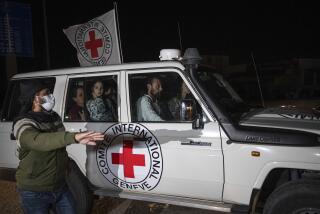Bosnia Leader Freed, but Attacks Follow : Yugoslavia: Muslims ambush the military convoy that had been involved in the swap for their president.
- Share via
BELGRADE, Yugoslavia — The federal army released the president of Bosnia-Herzegovina on Sunday after holding him hostage for 24 hours to secure free passage for an armored column trapped in the center of Sarajevo, the Bosnian capital.
The freeing of Muslim President Alija Izetbegovic and the movement of the tanks and armored vehicles from the city center momentarily eased the razor-sharp tensions that have gripped Sarajevo amid its worst violence since World War II.
But the incident highlighted the lawlessness that has consumed Bosnia-Herzegovina for the last two months, and a reported ambush of the army convoy threatened a major outbreak of new violence between republic defense forces and renegade federal army units using their superior weaponry to win territory for rebel Serbs.
Sarajevo Radio quoted a European Community envoy as saying that Muslim militants had attacked the departing federal forces, killing several of the soldiers who had been promised unhindered movement in return for Izetbegovic’s freedom.
An army statement released early today in Belgrade said two army colonels were among those killed, the Associated Press reported.
Izetbegovic was taken captive by soldiers at Sarajevo’s airport after returning to his newly independent republic Saturday from failed peace talks in Portugal in which Serbian politicians had insisted he personally take part.
An army general initially said the 66-year-old president had been detained for his own safety. But the Tanjug news agency, based in this Serbian and federal capital, accused Izetbegovic of provoking the violence that has shaken his republic since the majority of its 4.4 million citizens voted for independence Feb. 29.
The staunchly nationalist leader of Bosnian Serbs, Radovan Karadzic, repeated those accusations against Izetbegovic at a press conference in Belgrade, where he often visits to consult with Serbian President Slobodan Milosevic.
Karadzic justified the military actions against Sarajevo by claiming that the federal troops were fighting along “the future borders” of a Serbian autonomous region he wants established inside Bosnia-Herzegovina and eventually annexed to the new Yugoslavia proclaimed last week by Serbia and Montenegro.
Milosevic, although assisted by proxy allies such as Karadzic, is widely believed to be the mastermind behind the systematic ethnic uprisings and territorial seizures that have allowed Serbs to take control of one-third of Croatia and nearly two-thirds of Bosnia-Herzegovina.
More than 10,000 died in the roving battles in Croatia last year, and the death toll from two months of fighting in Bosnia-Herzegovina is thought to be more than 350. At least 10% of Bosnia-Herzegovina’s citizens have been chased from their homes by Serbian and federal troops, pushing the number of refugees from the Yugoslav crisis to well over 1 million.
Some Bosnian Serbs, who account for about 31% of the population, oppose secession from Yugoslavia because that would politically sever them from Serbia.
The release of Izetbegovic was negotiated by Colm Doyle, a determined Irish army officer who has headed the EC monitoring mission in Sarajevo since November.
Doyle and Sarajevo-based troops of the U.N. peacekeeping force for Croatia took custody of Izetbegovic until the army headquarters staff and some hardware were evacuated from a city garrison surrounded by Bosnia-Herzegovina’s predominantly Muslim and Croatian defense forces.
EC monitors, however, decided Sunday to suspend field observations until a secure cease-fire is in place.
The volatile standoff over Izetbegovic coincided with the most intense assault by army forces since fighting began. Mortar and artillery fire shook the city for 16 hours Saturday. There were no official casualty reports from the fierce assault, apparently because continued sniper fire prevented the recovery of the dead and wounded.
Belgrade Television, which as the official mouthpiece of the Serbian leadership is accorded access to army-controlled areas off limits to other journalists, showed what appeared to be dozens of corpses littering Sarajevo streets, strewn among broken glass, gutted buildings, charred vehicles and pools of blood.
Meanwhile, U.N. Undersecretary General Marrack Goulding traveled to Portugal on Sunday to meet with EC officials to discuss the possible expansion of the U.N. peacekeeping mission to include Bosnia-Herzegovina.
More than 14,000 blue-helmeted U.N. troops are to be based in the occupied areas of Croatia. Although the U.N. action is headquartered in Sarajevo, the troops have no mandate to intervene in Bosnia-Herzegovina, where the bulk of the fighting has shifted.
More to Read
Sign up for Essential California
The most important California stories and recommendations in your inbox every morning.
You may occasionally receive promotional content from the Los Angeles Times.











